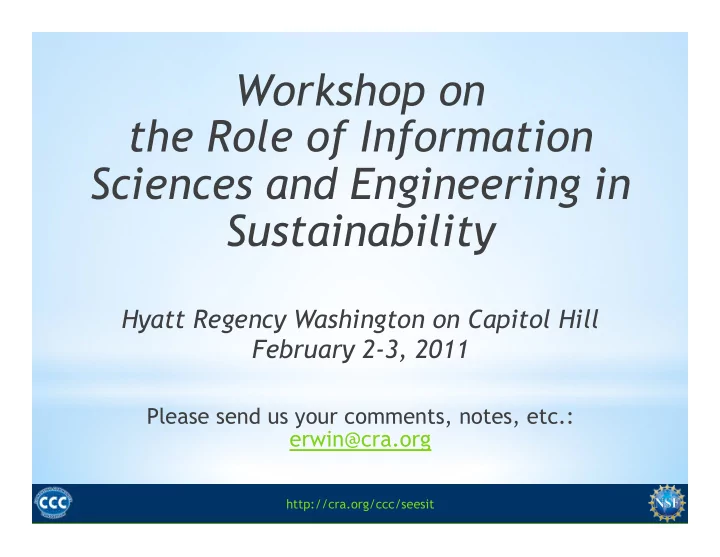

Workshop on the Role of Information Sciences and Engineering in Sustainability Hyatt Regency Washington on Capitol Hill February 2-3, 2011 Please send us your comments, notes, etc.: erwin@cra.org http://cra.org/ccc/seesit
o ! “meet present needs without compromising the ability of future generations to meet their needs” o ! One of many definitions – we’ll not quibble o ! NSF-wide investment area in “Science, Engineering, and Education for Sustainability” (SEES) o ! 5-year initiative: http://www.nsf.gov/sees o ! climate change, energy, and other aspects… o ! Computer and Information Science and Engineering (CISE) directorate participates, often in partnership with other directorates o ! CISE commissioned the Computing Community Consortium (CCC) to organize this workshop to explore the SEES research portfolio of the CSE community http://cra.org/ccc/seesit
Computing Community Consortium Focused on empowering the computing research community to pursue more audacious visions A broad-based standing committee of 20 leading U.S. computer scientists o ! Housed within the Computing Research Association (CRA), representing >200 U.S. & Canadian academic departments and industrial research labs o ! Chair: Ed Lazowska, U-Washington o ! Vice-Chair: Susan Graham, UC-Berkeley o ! Director: Erwin Gianchandani, CRA [erwin@cra.org] A multitude of activities: o ! Community-initiated visioning workshops – bringing This Week’s Highlight: researchers together to generate “out-of-the-box” ideas Fruit Fly Suggests New o ! White papers for the White House & others – short Solution to Computer reports to inform policymakers Networking Problem o ! Public relations efforts – Library of Congress symposiums, Research “Highlight of the Week,” CCC Blog o ! Nurturing the next generation of leaders – Computing Innovation Fellows, “Landmark Student Contributions” http://cra.org/ccc Funded via a Cooperative Agreement with the National Science Foundation
o ! DCL: “Achieving a sustainable human future in the face of both gradual and ! abrupt environmental change is one of the most significant ! challenges facing humanity.” o ! Research portfolio includes several challenges in CISE areas: o ! novel energy production…and intelligent control o ! innovative CSE methods and systems for monitoring, understanding, and optimizing life-cycle energy costs and carbon footprints o ! data analysis, modeling, simulation, visualization and intelligent decision-making facilitated by advanced computation… o ! research to enable a new generation of observational networks o ! development of cyberinfrastructure and instrumentation to enable sustainability science and engineering o ! support of the physical, cyber and human infrastructure necessary http://cra.org/ccc/seesit
o ! Routine application of CSE o ! there will be many, many such applications that address sustainability needs o ! Incremental research innovation in areas where work is already underway o ! examples: low-power electronics, data-center energy management, process control for new renewable electricity sources, … o ! cumulative effect of incremental work can be large o ! forecasts often under-estimate this kind of change o ! Research that leads to “radical” approaches o ! transformative or “game changing” developments o ! but don’t violate the laws of physics http://cra.org/ccc/seesit
o ! Hardware/software control of real-time, life-critical equipment such as automobiles o ! We do it now: costly, limited applications o ! We’ll need to do it more: optimizing for performance will lead to more complex software o ! and to interactions with other vehicles, people, infrastructure o ! Would like to provide interfaces to open opportunities for innovation, without compromising safety o ! …there might be radical approaches to this problem http://cra.org/ccc/seesit
o ! Human genome sequencing: symbiosis of molecular biology and computer science o ! early days (1990-2000) reading fragments and assembling o ! ~600 nucleotides/fragment o ! Meyers, Celera o ! new algorithms developed (but matching not a new problem) o ! Next Generation Sequencing (NGS) o ! parallel sequencing, ~100 nucleotides/fragment, headed down o ! still more new assembly algorithms o ! Now there’s a reference human genome o ! still more new algorithms o ! The problem keeps changing… http://cra.org/ccc/seesit
o ! Brainstorm new research directions o ! Identify important problems facing sustainability that CSE might address o ! Interact with other workshop attendees, with different technical backgrounds, to imagine new approaches o ! Integrate with the entire group, report o ! Send afterthoughts by email to erwin@cra.org Please try to avoid: o ! Extolling your own research area only o ! Focusing only on incremental work http://cra.org/ccc/seesit
o ! Plenary speakers and panels to stimulate thinking o ! Breakouts, loosely driven by topics, to discuss ideas o ! Please help us keep the groups small and interactive o ! Report back to the entire group o ! Final integrative session Friday afternoon o ! Organizing committee will draft a report, circulate for further comments We have tight schedules. Please try to stay on time. http://cra.org/ccc/seesit
Recommend
More recommend